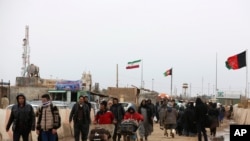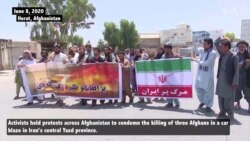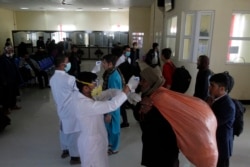Video footage earlier this month of Iranian police with a burning car carrying Afghan refugees has received wide condemnation inside Afghanistan and renewed debate about the plight of Afghans in Iran.
On June 3, a car carrying 13 Afghan migrants was set ablaze in Iran’s central Yazd province, killing three and injuring four. The video went viral on social media.
Abdul Ghafoor Lewal, the Afghan ambassador in Tehran, told VOA that Iranian authorities have “accepted” that the car was shot at by Iranian security forces, causing sparks that started the fire. He added that local authorities vowed a thorough investigation.
Iranian officials say police suspected the car was carrying drugs and undocumented immigrants. According to Ahmad Tarahomi, Yazd province’s deputy governor, police shot at the car after it ignored calls to stop at a checkpoint.
Painful memories
For 25-year-old Ali Hassan, the scenes of burning Afghans and a boy pleading, "Give me some water. I am burning," are all too painful and remind him of his dangerous eight-day journey from Zaranj, Afghanistan, to Isfahan, Iran.
“Every moment of it was filled with fear. We were scared to death,” Hassan told VOA. For safety concerns, he does not reveal his real name.
A resident of Bamiyan province, Hassan entered neighboring Iran at an illegal border-crossing in early 2014 when he was 19 years old.
He said he was warned of what might happened if he was captured by the Iranian police: "They can bury you alive, and no one would know about it.” Nevertheless, he rode in a Toyota run by Afghan smugglers, his only chance, he said, to find a job to pay for college.
“We were 13 people — two were sitting in front, eight were sitting in the back, and three of us were in the trunk,” Hassan said.
Had they encountered Iranian border guards, Hassan said his fate could easily have turned out like the Afghan refugees.
Wide reactions
The deadly car burning has prompted angry marches in Europe, the United States and Afghanistan, where protesters chanted anti-Iran slogans and burned the Iranian flag.
Habiba Razai, a protester from western Herat City, told VOA that Afghans are demanding an independent investigation into the incident.
“We’ve kept silent to everyday oppression of us in the neighboring [country]. We call on the central government and the international community to pursue the killing,” Razai said.
Iran’s Foreign Ministry summoned the Afghan ambassador last week in Tehran over the protests, calling them “offensive moves" against the Iranian diplomatic missions in Afghanistan.”
For its part, the Afghan government said it would quickly send a high-ranking delegation to Iran to prevent deadly recurrences such as the car burning and to discuss border security.
In a press release last week, the Afghan Foreign Ministry said it was calling on “the friendly and brotherly country of Iran to treat the citizens of Afghanistan with a spirit of tolerance and cooperation.”
Reports of Iranian police using violence against Afghan refugees is not new. Last month, Afghan officials said that at least 12 migrant workers were drowned and 17 went missing when Iranian border guards allegedly forced them at gunpoint into a river that runs between Iran and Afghanistan. Iran has denied those allegations.
Deportations
The United Nations estimates there are 3 million Afghans in Iran, about 900,000 of them are refugees. The rest are documented or undocumented migrants.
Officials in Kabul say thousands of Afghans have been deported by Iran in recent months since the outbreak of the coronavirus.
Jawed Nadim, the Refugees Repatriation Department chief in Herat, told VOA that Iran in recent weeks has deported between 400 to 600 Afghans daily.
“Unfortunately, the Iranian side has resumed deporting Afghans, and the number of deportees has increased in the last two months,” he said.
‘Broader discrimination’
According to Hassan, Afghan refugees in Iran also face discrimination, in addition to abuse.
The “majority of Iranians consider Afghans to be the reason for the lawlessness. They think Afghans are stealing their jobs, and they treat Afghans badly,” he told VOA.
Hassan was deported to Afghanistan after working for about 1 ½ years in a recycling facility in Isfahan. He said he was arrested by Iranian security while he was visiting relatives during the Muslim Eid festival.
Hassan’s encounter was confirmed by Mohammad Aslam Gharjistani, a 35-year-old Afghan who spent three years as a construction worker in Iran’s Mashhad province.
“Afghans are not considered as human beings in Iran,” he said, adding that Iran’s regime was not protecting refugees from hate crimes.
Iranian officials, however, say Afghan refugees are welcomed in their country but a lack of border control by Kabul, combined with increased human trafficking, have become an issue for Tehran.
“Afghan citizens are very respected, but their border passing should be legal and regulated,” Mohsen Baharvand, Iranian deputy foreign minister for International and Legal Affairs, told the IRNA news agency in an interview on June 6.
In 2019, the Iranian government passed a law providing refugees, including Afghans, with specific rights, and an opportunity toward residency for refugees with Iranian spouses and children.
Despite the claims by Tehran, Human Rights Watch says Afghans in Iran are increasingly hindered from humanitarian aid and social services, while arbitrarily arrested and abused by security forces.
According to Fatemeh Ashrafi, executive director of the HAMI Association, the refugee women and children protection group in Tehran, Afghans with no documentation are particularly vulnerable in Iran.
She emphasized that “there is a need for some sort of legislation to fight human trafficking and observe refugees’ rights.”
Fatemeh Aman, a senior fellow with the Atlantic Council in Washington, charged that laws on Afghan refugees and immigrants in Iran were “inadequate and ambiguous.” The laws, she said, provide no support, even for the second generation of Afghans who were born and raised in Iran.
Aman said the Afghan refugee car burning incident is becoming politicized between the two countries, warning, “This is as harmful to refugees' rights as preceding practices of Tehran using Afghan refugees as a leverage in dealings with the United States and the Afghan government.”







